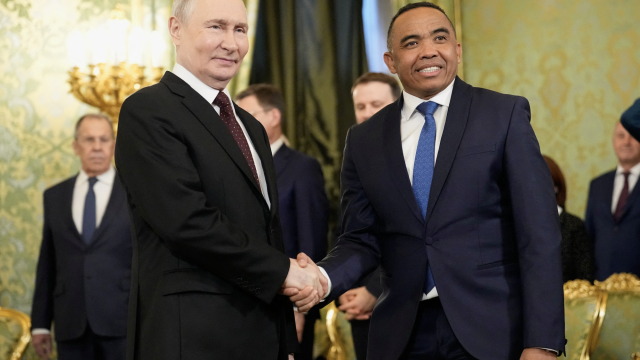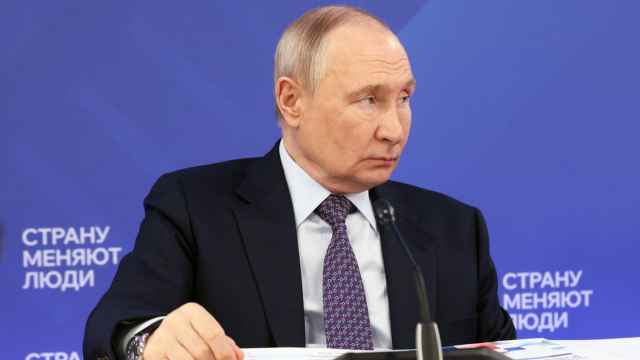The Communications and Press Ministry has abandoned a proposal to remove national roaming, agreeing with mobile phone operators and analysts that the add-on options that customers can turn on while roaming already provide sufficient savings.
State Duma deputies and market analysts reviewed the matter and came to a conclusion that the existing pricing is competitive enough. The market will regulate itself, Denis Sverdlov, adviser to Communications and Press Minister Nikolai Nikiforov, said at a round-table discussion Thursday.
The proposal to remove national roaming — mobile phone connectivity in a location different from the region where the service is registered — was put forward by Nikiforov as one of the development goals to be achieved by 2018.
National roaming is "some sort of tax on travel that you, business people, pay when you travel between regions in the same country, within the same economic space," Nikiforov told experts at a May meeting.
Vitaly Solonin, head of the wireless department at the IT and telecom research company J'son & Partners Consulting, said the existing add-on options for tariffs already had the effect that the ministry wanted to achieve. More so, the widespread adoption of smartphones and computer tablets resulted in more people using Skype or Multifon apps to make long-distance calls, Solonin said. The concept of roaming, as such, is ceasing to exist, he added.
"The [original] amendments to the law were aimed to solve the problem [of high prices when roaming]. This problem doesn't exist anymore, nor the need for such amendments," Sverdlov said.
"What do they call [roaming]? The tax on travel? Some operators' rates are differentiated based on the time of day, with cheaper prices at night, when the network is not under full load. Should we call the [day pricing] a tax on night life?" said Yuri Gedgafov, partner at Ernst & Young.
Interfering with retail pricing is dangerous because it would inevitably result in price increase across the full range of call plans, Gedgafov said.
The amendments put forward to the federal law on telecommunications require mobile operators to notify customers with a text message each time they enter a new region. The text message must include information about options that reduce roaming costs.
Turning these options on and off will remain the responsibility of the customer.
It may pose a problem, because if the user forgets to turn it on, he or she will be charged a premium, said Alexander Borisov, manager of the Angry Citizen portal.
Having lost the fight against the mobile number portability, or MNP, operators joined their forces lobbying against further changes proposed by the ministry. They won in this case and the ministry decided to sit on the issue for the time being, Denis Kuskov, head of the Information Analysis Agency Telecomdaily, said.
The issue is political rather than economic, said Gleb Shuklin from the Russian Association for Electronic Communications.
As a whole, the idea is all about removing digital inequality and forming a common telecommunications field in Russia. However, because of certain ways regional network segments interact with each other technically, this task has proved to be difficult. The ministry is trying to find a balance between the interests of users and operators, Shuklin said.
Mobile phone penetration in Russia reached 160 percent last year, with most people having more than one phone subscription, according to the data from AC&M research group.
Earlier this year, Vedomosti reported that SIM cards sold from portable kiosks concentrated around train stations and tourist areas account for up to 15 percent of all mobile subscriptions sold in Russia annually.
Contact the author at [email protected]
A Message from The Moscow Times:
Dear readers,
We are facing unprecedented challenges. Russia's Prosecutor General's Office has designated The Moscow Times as an "undesirable" organization, criminalizing our work and putting our staff at risk of prosecution. This follows our earlier unjust labeling as a "foreign agent."
These actions are direct attempts to silence independent journalism in Russia. The authorities claim our work "discredits the decisions of the Russian leadership." We see things differently: we strive to provide accurate, unbiased reporting on Russia.
We, the journalists of The Moscow Times, refuse to be silenced. But to continue our work, we need your help.
Your support, no matter how small, makes a world of difference. If you can, please support us monthly starting from just $2. It's quick to set up, and every contribution makes a significant impact.
By supporting The Moscow Times, you're defending open, independent journalism in the face of repression. Thank you for standing with us.
Remind me later.






